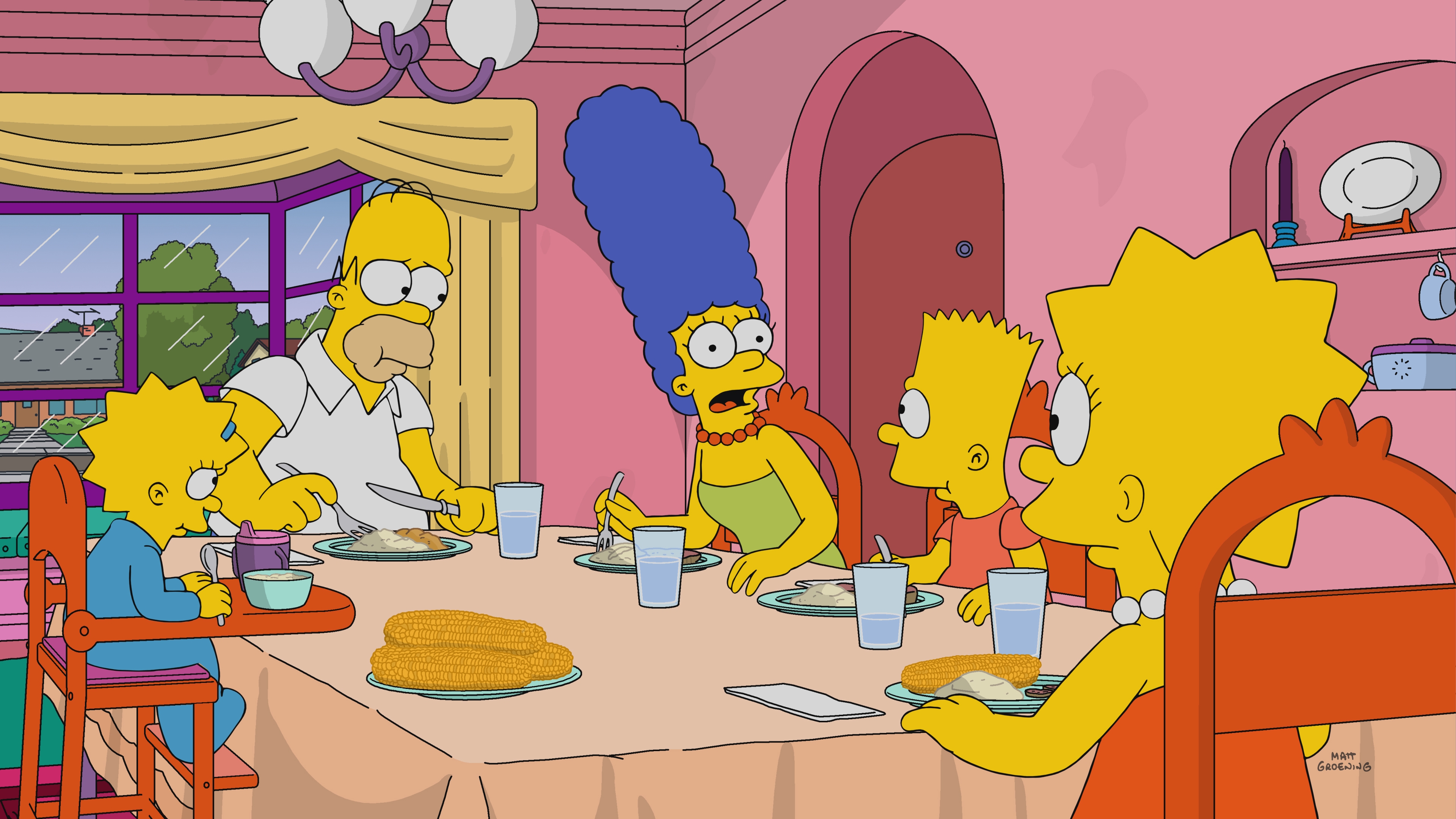Regrettable gags: The Simpsons is never worse than when it goes specifically topical. Thematically topical, sure. The Simpsons has whipped some surprisingly subtle and nuanced social satire on us over the years, but that’s a whole different and much more lasting thing than seeding an episode with winking pop culture references. Here, when Lisa assures Maggie that she won’t be jealous of Maggie’s newfound talent and fame, she says that they can share the “gifted Simpsons” limelight equally, like those guys behind South Park. She then panics at the weakness of the comparison, because, as she cries, “Except Trey does everything!” Okay, couple of things. While real world pop culture is a vital part of the show’s world, making offhand pop culture jokes about particular pop culture figures not only dates an episode, it almost always violates the show’s characters. Could Lisa have seen South Park in The Simpsons’ Springfield? Sure. But having Lisa crack wise on a hackneyed topic that’s not only old but too old for her specifically makes it clear that we’re hearing a writer’s voice and not Lisa Simpson’s. (See also: any time the show drops in a Kardashian joke. Spare us.)
The same goes for Abe’s joke to some bird sanctuary buzzards, where he warns them off, claiming that his blood has “turned to bile from watching Fox News,” albeit for a different reason. As a thinking human who values actual journalism and really hates racism and intellectual dishonesty, a bit of Fox News-bashing doesn’t bother me. However, here, too, the joke calls attention to itself in a way that doesn’t so much violate the character (although if Abe is one of Fox’s older-skewing demographic, he’d be too bile-bloated to comment on it), as much as it’s too obviously intended to preach to the choir. I mean, there may be bigoted, dead-hearted Simpsons fans at this point. God knows smart, funny animated shows have attracted an unwanted yahoo demo of late. But, at heart, The Simpsons is a deeply humanistic series, and lobbing out head-nodding audience affirmation jokes like rewards from a t-shirt cannon is awfully lazy and, more importantly, detracts from the task of developing the episode as a coherent story.
Along those lines, as nice as it is to have a Homer-Maggie story as a change of pace, the whole “Maggie is secretly a genius at [insert unlikely discipline here]” trope is never as funny as the show thinks it is. The whistling thing doesn’t provide the necessary closeness between father and baby the story is stretching for in it’s too-short duration, but at least the idea remains at the furthest, most cartoonish edge of what passes for realism in Springfield. The reveal that she’s also a master painter as a tag to the episode is… just there, another such joke in a long, unprofitable line. But some of the worst jokes in series history are the ones where someone thinks it’s a hoot to attribute adult vices to little kids, something that Homer sees when watching a TV expose of a former baby actor who grew into toddler-dom only to find herself “waking up next to stuffed animals whose names she didn’t know.” Ugh.
Decent gags: Apart from the fact that Marge’s story takes forever to get to the cathouse (especially considering how little meat there is to the truncated story once we get there), the dynamic of Springfield mean girls Luanne, Helen Lovejoy, and Bernice Hibbert picking on Marge’s supposed (okay actual) lack of home decorating taste does give us the line “Marge, did you corncob a cathouse?,” so that’s one on the plus side. Apart from that, the best jokes come from Marge’s interactions with Fat Tony and stalwart goons Legs and Louie. Putting Marge into close proximity with unsavory types is usually a winner, and the dynamic here—switching from her cheery cluelessness to effectively motherly scolding—keeps paying off, especially with Mantegna’s silkily evil purr working alongside. Mantenga is one of those few guest stars who’s staked out a place in the show’s recurring character firmament, and when he cooingly assures Marge that walls collapse all the time in the “implosion district” where his post office turned brothel lives, his grifter’s patter is on-point. Later, when Marge asks why Legs and Louie are always following them around, Tony replies patiently, “Have you noticed how we’re not dead?” And, once Marge scuttles the brothel plan with a plot device so perfunctory you wonder why they bothered, and calls her benefactor a “big, fat liar,” Fat Tony’s reply that only his don and his interior decorator have ever dared call him fat is followed seamlessly by his menacing, “You are lucky.” Fat Tony is funny, is where I’m going with this.
Summation: Meh. The Homer-Maggie storyline skewers reality competition shows, unimaginatively. And that’s only after, like Marge’s detour with her kaffeeklatsch, Homer takes a detour into an abortive plot about using Maggie’s whistling talent to fool everyone at Moe’s that he can whistle. So that’s two truncated parallel stories that don’t really get going until they each have a false start. Not great. Also, the would-be connective tissue that Marge and Homer have to learn not to keep secrets from one another just evaporates into afterthought. It does produce one funny line where Homer, after promising not to secretly enter Maggie in any future contests, states that Marge, in turn, will not decorate “another sex palace for the mob.” One final point in the plus column on the way out, anyway.
Stray observations
- Snowball II and Santa’s Little Helper are apparently lovers, which, sure.
- “I’m taking you where you can be a kid again—Moe’s!”
- “This I gotta hear. Not because I’m looking
forward to it, but because it is my job.”
- “Time to learn a happy tune from these imprisoned birds!”
- Lenny, warning Homer about the dangers of child stardom: “I mean, look at ron Howard. He wasn’t won an Oscar since, like, 2002!”









































